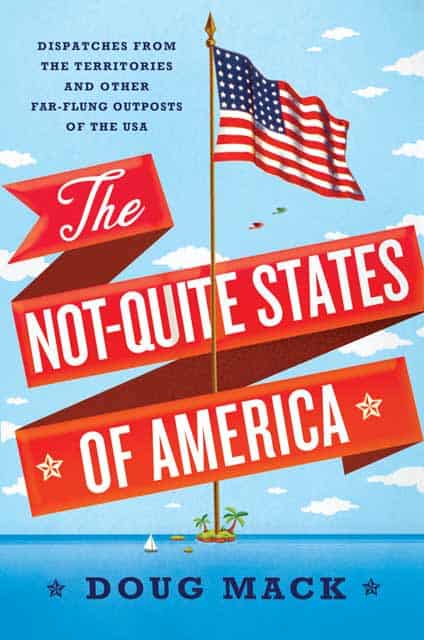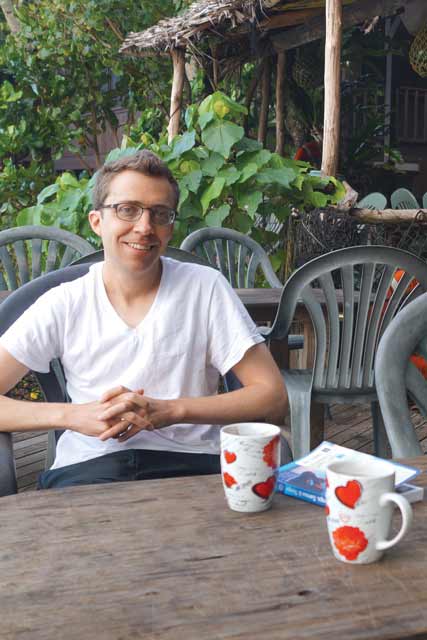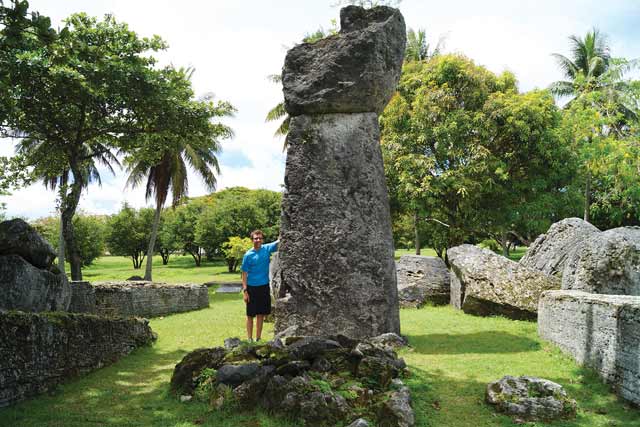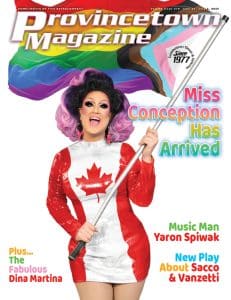by Steve Desroches
Top Image: Doug Mack and his wife Maren in American Samoa.
On November 1, 1961, just a couple of years after Hawaii was admitted to the Union as the 50th state, the song “Fifty Nifty United States” premiered on Perry Como’s Kraft Music Hall, a wildly popular television variety show. The simple, yet catchy ditty is a standard to this day in elementary schools for teaching children the names of the 50 states through song, leaving a lyric blank at the end so kids can shout out their home state as their favorite. School children in the District of Columbia no doubt feel left out as the nation’s capital makes no appearance in the song, reflective of its peculiar political geographic status. But what about Guam or the Northern Mariana Islands? The residents of those Pacific Ocean islands are Americans, yet “Fifty Nifty United States” doesn’t include them in its clever alphabetical mnemonic device.
Indeed many Americans don’t even know that they share citizenship with the four million residents of the five American territories of Puerto Rico, the U.S. Virgin Islands, Guam, the Northern Mariana Islands, and American Samoa. These geographic anomalies provided an irresistible road map for writer Doug Mack who explored these outposts of the red, white, and blue for his book The Not-Quite States of America: Dispatches from the Territories and Other Far-Flung Outposts of the USA, his travelogue about which he will speak at the Provincetown Book Festival this Saturday.

As a writer, Mack looks for not just the road less traveled, but for where there really is no road at all. Those places in the world that go largely ignored and the stories that you can find there are what appeal to him the most. In his first book, Europe on Five Wrong Turns a Day, he crossed the continent using a 50-year-old guidebook. But it was his wife Maren’s hobby that led to his next adventure. An avid coin collector, she was always sorting through pocket change looking to fill her album with all the 50 state quarters (the most successful numismatic program in history). Of course, each quarter released into circulation featured an image representing one of the 50 states. But one day in their Minneapolis home he heard her exclaim, “Oh, good, Guam.” While the program began in 2008, it took a year for Congress to pass another bill expanding the program to include Washington, D.C., and the territories. That moment gave him pause. Here he was a graduate of Carleton College with a degree in American Studies and he knew next to nothing about the territories. He did a Google search to learn more and look for a book about them. Nothing.
“I thought, ‘Man somebody needs to write a book about them’,” says Mack. “So, I did.”

Rarely if ever does the national media cover anything about the territories, unless its some sort of tragedy or natural disaster, says Mack. And the residents of each of the five territories are acutely aware that most of their fellow countrymen and women don’t know anything about them. And consider that back in 2017 Secretary of Energy Rick Perry referred to Puerto Rico as a country, and President Donald Trump said in a speech he had met with the “President of the Virgin Islands,” casting doubt if he knew that HE is the President of the U.S. Virgin Islands. Mack’s adventures visiting and researching these distant corners of the American experience tell a fascinating tale of not just one man’s travels, but of the history and culture that are every bit part of the fabric of America as are those in Texas, New York, or California, even if no one within the 50 states knows it.
“Over 1 million tourists from Japan visit Guam every year,” says Mack. “It’s absolutely true that Guam is much better known in Japan that in the U.S., even though it’s part of the U.S.”
The Not-Quite States of America is a geography nerd’s dream, as it weaves a compelling narrative about these neglected locales that don’t get a star on the flag. The travelogue brings these territories deeper into our collective consciousness as well as to what it means to be an American. Of course, hurricanes Irma and Maria, which devastated Puerto Rico and the U.S. Virgin Islands, brought these Caribbean islands to the attention of many Americans, as has the ongoing political crisis in Puerto Rico. Mack traveled to both spots prior to the hurricanes, but his book did get a bump in sales afterward, as presumably others around the country scratched their heads to understand these islands and their position as part of the United States, or more accurately as the book title states, kind of part of the United States.

Mack delves into the history around these territories and their odd political status of having no votes in the Electoral College, no voting representation in Congress, and in turn being completely at the mercy of Congress who decides when and how the Constitution and federal law apply to them, if at all. But he also provides a person-to-person narrative as he speaks with the residents of each of the territories so they can tell their own stories and in turn their unique mixture of being totally American, while also holding onto their native culture just as tightly. Through reading the perspectives and experiences of these inhabitants of the territories, you get a glimpse into their futures as well, whether it be independence, statehood, or the status quo. But above all else, it removes these far off lands from the abstract and brings them into sharper focus.
“They like having their dual cultural identities,” says Mack. “It’s not a 50/50 thing, but a 100 percent and a 100 percent. For instance, they identify as 100 percent Samoan and 100 percent American in American Samoa. There are certainly a variety of opinions, but most everyone wants more fundamental rights, like to be able to vote for president. But most of all, they really feel their stories aren’t being told. They want the rest of the country to hear them. ”
Doug Mack appears at the Provincetown Book Festival at the Provincetown Public Library, 356 Commercial St. on Saturday, September 14 at noon on the panel State(s) of Travel with writer Elizabeth Bradfield. The event is free. For more information visit provincetownbookfestival.org or call 508.487.7094.




